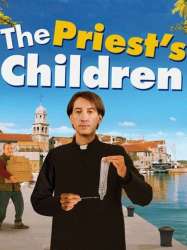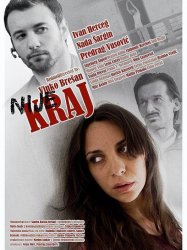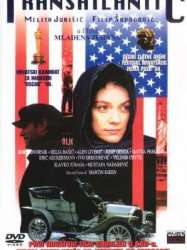Mate Matišić is a Scriptwriter and Sound Croate born on 17 january 1965

Mate Matišić (born 17 January 1965) is a Croatian playwright, screenwriter, composer and musician. His plays have been staged in Croatian theaters as well as internationally, and some of them have been adapted into feature films. As a composer, he is best known for his film and theatrical music. He is a three-time winner of Golden Arena for Best Film Music, awarded at the Pula Film Festival.
Between 1996 and 1998, Matišić worked as a dramaturge in Jadran Film. Since 1998, he works at the Croatian Radio. He is also a docent at the Academy of Dramatic Art, University of Zagreb, where he is head of the Department of Dramaturgy. He is married and a father of three.
Literary work
Matišić began to write in his senior year in high school. He wrote his first play, Namigni mu, Bruno!, in 1985; it premiered in the Croatian National Theatre in Split in 1987 as Bljesak zlatnog zuba. Upon seeing the play, film director Krsto Papić asked Matišić to help him with the screenplay for My Uncle's Legacy. This was Matišić's first screenwriting credit, and the beginning of collaboration with Krsto Papić, with whom he worked on three more feature films.
Matišić's plays have been described as "shocking". His most controversial play, Angels of Babel (Anđeli Babilona), staged in Gavella Drama Theatre, features a rural politician that has a sexual intercourse with a sheep, which some interpreted as an allusion to the President of Croatia and some other high-ranked Croatian politicians. From comedies that marked his early career, Matišić moved towards dark humor and more sombre subjects, with death as one of his major themes. Matišić's plays have been staged in Croatia (Split, Rijeka, Varaždin and Zagreb), Macedonia, Slovenia, Bulgaria, Hungary and Russia.
His most recent theatrical work, Posthumous Trilogy (Posmrtna trilogija, 2006) is a collection of three plays: Sons Die First (Sinovi umiru prvi), No One's Son (Ničiji sin) and The Woman Without a Body (Žena bez tijela). Although these three plays share some common motifs such as fatherhood, belonging and family, and all three end in suicide of the protagonist, Matišić described them respectively as a tragicomedy, a drama, and a dark-humored psychological thriller. No One's Son and The Woman Without a Body have been adapted into feature films, No One's Son and Will Not End Here, both released in 2008.
Music
Matišić composed film music for all four Vinko Brešan's feature films, winning Golden Arena for Best Film Music for two of them: Marshal Tito's Spirit in 2000 and Witnesses in 2003. He won his third Golden Arena for Best Film Music for No One's Son in 2008. Apart from film scores, he composed music for theater and television.
Matišić is a multi-instrumental musician and a member of Hot Club Zagreb, a gypsy jazz band with international experience. His long-standing interest is music of Django Reinhardt, which has been the subject of his research for more than two decades.
Source : Wikidata
Mate Matišić

- Infos
- Photos
- Best films
- Family
- Characters
- Awards
Biography
Matišić was born in Ričice, near Imotski. At the age of six, he moved to Zagreb, where he finished elementary and high school. Matišić graduated from the Faculty of Law, University of Zagreb, but he never practiced law.Between 1996 and 1998, Matišić worked as a dramaturge in Jadran Film. Since 1998, he works at the Croatian Radio. He is also a docent at the Academy of Dramatic Art, University of Zagreb, where he is head of the Department of Dramaturgy. He is married and a father of three.
Literary work
Matišić began to write in his senior year in high school. He wrote his first play, Namigni mu, Bruno!, in 1985; it premiered in the Croatian National Theatre in Split in 1987 as Bljesak zlatnog zuba. Upon seeing the play, film director Krsto Papić asked Matišić to help him with the screenplay for My Uncle's Legacy. This was Matišić's first screenwriting credit, and the beginning of collaboration with Krsto Papić, with whom he worked on three more feature films.
Matišić's plays have been described as "shocking". His most controversial play, Angels of Babel (Anđeli Babilona), staged in Gavella Drama Theatre, features a rural politician that has a sexual intercourse with a sheep, which some interpreted as an allusion to the President of Croatia and some other high-ranked Croatian politicians. From comedies that marked his early career, Matišić moved towards dark humor and more sombre subjects, with death as one of his major themes. Matišić's plays have been staged in Croatia (Split, Rijeka, Varaždin and Zagreb), Macedonia, Slovenia, Bulgaria, Hungary and Russia.
His most recent theatrical work, Posthumous Trilogy (Posmrtna trilogija, 2006) is a collection of three plays: Sons Die First (Sinovi umiru prvi), No One's Son (Ničiji sin) and The Woman Without a Body (Žena bez tijela). Although these three plays share some common motifs such as fatherhood, belonging and family, and all three end in suicide of the protagonist, Matišić described them respectively as a tragicomedy, a drama, and a dark-humored psychological thriller. No One's Son and The Woman Without a Body have been adapted into feature films, No One's Son and Will Not End Here, both released in 2008.
Music
Matišić composed film music for all four Vinko Brešan's feature films, winning Golden Arena for Best Film Music for two of them: Marshal Tito's Spirit in 2000 and Witnesses in 2003. He won his third Golden Arena for Best Film Music for No One's Son in 2008. Apart from film scores, he composed music for theater and television.
Matišić is a multi-instrumental musician and a member of Hot Club Zagreb, a gypsy jazz band with international experience. His long-standing interest is music of Django Reinhardt, which has been the subject of his research for more than two decades.
Usually with
Filmography of Mate Matišić (18 films)
Scriptwriter

On the Other Side (2016)
, 1h25Directed by Zrinko Ogresta
Origin Croatie
Genres Drama
Actors Ksenija Marinković, Lazar Ristovski, Tihana Lazović, Alen Liverić
Roles Writer
Rating66%






The Priest's Children (2013)
, 1h36Directed by Vinko Brešan
Origin Croatie
Genres Drama, Comedy, Comedy-drama
Themes Seafaring films, Transport films
Actors Krešimir Mikić, Krešimir Mikić, Marija Škaričić, Dražen Kühn, Jadranka Đokić, Goran Bogdan
Roles Scenario Writer
Rating67%





Don Fabijan (Krešimir Mikić) is a young priest who comes to serve on an unnamed small island in the Adriatic.

No One's Son (2008)
, 1h40Directed by Arsen Anton Ostojić
Genres Drama
Themes Films based on plays
Actors Mustafa Nadarević, Alen Liverić, Goran Grgić, Zdenko Jelčić, Daria Lorenci, Dražen Kühn
Roles Writer
Rating72%






It Will Not End (2008)
, 1h40Directed by Vinko Brešan
Genres Drama, War, Comedy
Themes Films based on plays
Actors Ivan Herceg, Nada Šargin, Predrag Vušović, Ljubomir Kerekeš, Dražen Kühn, Leon Lučev
Rating70%






Infection (2003)
, 1h45Directed by Krsto Papić
Genres Horror
Actors Leon Lučev, Lucija Šerbedžija, Filip Šovagović, Dražen Kühn, Ivo Gregurević, Božidar Alić
Rating57%






Fine Dead Girls (2002)
, 1h17Directed by Dalibor Matanić
Origin Croatie
Genres Drama, Thriller
Themes Films about sexuality, LGBT-related films, LGBT-related films, LGBT-related film, Lesbian-related films
Actors Nina Violic, Olga Pakalovic, Krešimir Mikić, Krešimir Mikić, Jadranka Đokić, Milan Štrljić
Roles Author
Rating70%





Iva and Marija, who are a lesbian couple, rent an apartment in Zagreb in a building that seems to be quiet and a safe environment for their love. But as time passes by, the atmosphere in the house gets more and more aggressive.

Transatlantic (1998)
Genres Thriller, Crime
Actors Filip Šovagović, Relja Bašić, Slavko Brankov, Ivo Gregurević, Goran Grgić, Alen Liverić
Roles Writer
Rating60%






When the Dead Start Singing (1998)
Directed by Krsto Papić
Genres Drama, Comedy, Adventure
Actors Ivo Gregurević, Ksenija Pajic, Matija Prskalo, Boris Miholjević, Dražen Kühn, Predrag Vušović
Rating75%






Story from Croatia (1991)
, 1h50Directed by Krsto Papić
Genres Drama
Actors Ivo Gregurević, Mustafa Nadarević
Roles Story
Rating67%






My Uncle's Legacy (1988)
, 1h56Directed by Krsto Papić
Genres Drama
Actors Alma Prica, Davor Janjić, Branislav Lečić, Miodrag Krivokapić, Anica Dobra, Ivo Gregurević
Roles Writer
Rating71%





Sound

On the Other Side (2016)
, 1h25Directed by Zrinko Ogresta
Origin Croatie
Genres Drama
Actors Ksenija Marinković, Lazar Ristovski, Tihana Lazović, Alen Liverić
Roles Original Music Composer
Rating66%






The Priest's Children (2013)
, 1h36Directed by Vinko Brešan
Origin Croatie
Genres Drama, Comedy, Comedy-drama
Themes Seafaring films, Transport films
Actors Krešimir Mikić, Krešimir Mikić, Marija Škaričić, Dražen Kühn, Jadranka Đokić, Goran Bogdan
Rating67%





Don Fabijan (Krešimir Mikić) is a young priest who comes to serve on an unnamed small island in the Adriatic.

The Color of the Chameleon (2013)
, 1h33Directed by Arsen Anton Ostojić
Origin Croatie
Genres Drama, War, Thriller, Comedy
Themes Political films
Actors Alma Prica, Mustafa Nadarević, Rousy Chanev, Olga Pakalovic, Miraj Grbic, Samuel Finzi
Rating79%





In 1977, fifteen years before the Bosnian War ravaged their lives, Halima’s (Alma Prica) niece Safija (Olga Pakalović) became pregnant by Slavomir (Mijo Jurišić), a Serb man. Beaten and ostracized by her Bosniak family, Safija gave the infant boy to the childless Halima to raise, telling Slavomir it was stillborn. Twenty-three years later, the devastating war has ended. Bodies are being identified through DNA samples and returned to families for burial. Halima’s husband is found, but the boy cannot be returned to her without a blood sample. And that would have to come from Safija who ran away years ago and married Slavomir. When Halima finally locates her, Safija refuses the blood test because she is afraid her husband will discover her deception. And other deceptions could be uncovered as well, including the shocking identity of the soldier who took Halima’s husband and the boy to their deaths.

No One's Son (2008)
, 1h40Directed by Arsen Anton Ostojić
Genres Drama
Themes Films based on plays
Actors Mustafa Nadarević, Alen Liverić, Goran Grgić, Zdenko Jelčić, Daria Lorenci, Dražen Kühn
Rating72%






It Will Not End (2008)
, 1h40Directed by Vinko Brešan
Genres Drama, War, Comedy
Themes Films based on plays
Actors Ivan Herceg, Nada Šargin, Predrag Vušović, Ljubomir Kerekeš, Dražen Kühn, Leon Lučev
Roles Music
Rating70%





 Connection
Connection


